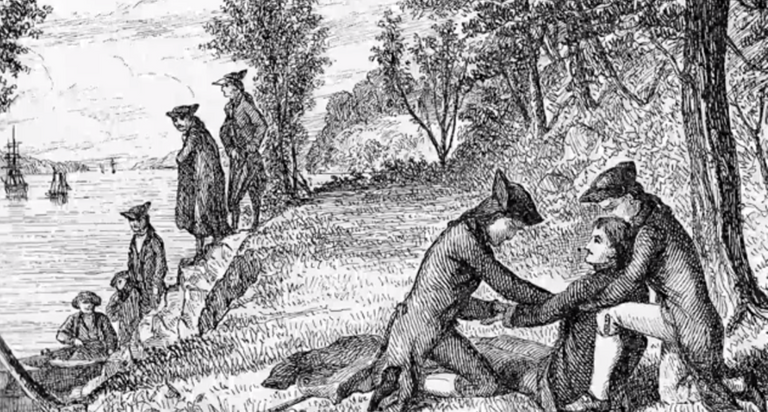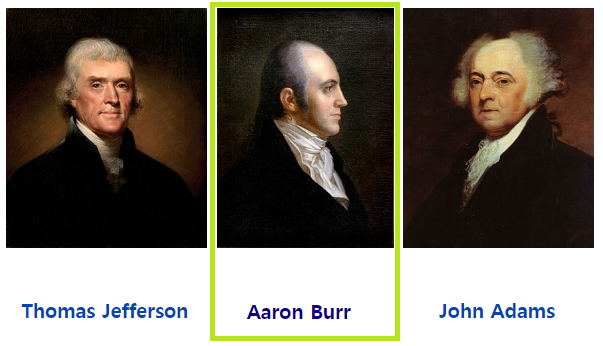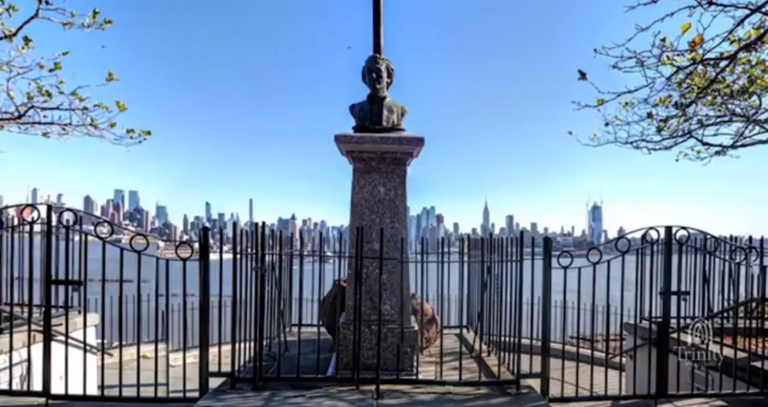<Source: trinity church>
1. Who was Alexander Hamilton?
There were a lot of American politicians who died emptily, but personally I would like to put this person as the most empty death.
He is Alexander Hamilton(1757~1804), who was the first US Treasury Secretary. and is the main character of US $ 10.
There were only two people who were not presidents in U.S. dollar bills. One of them is Hamilton and the other is Benjamin Franklin. That's what it means to be an historic figure. Two people whom George Washington first loved, one was Treasury Secretary Hamilton, and the other was Secretary of State Jefferson.
Let's take a quick look at his achievements.
He was one of the founding fathers of America and a federalist. He allowed all states to share in the federal debt due to the Revolutionary War, establishing a central bank. As southern states rebelled against this federal policy, Hamilton was able to implement these policies as a condition to move the capital from New York to Washington DC. As a result, these policies are believed to have made a significant contribution to the growth of the early United States.
2. Hamilton who hated Burr, Burr who hated Hamilton more than that
Hamilton had a political rival, Aaron Burr. Burr is a person who has been the third vice president of the United States. He hated Burr extremely, though Burr hated Hamilton more than that.
There are many reasons why they dislike each other.
First, Hamilton's father-in-law lost his position as a senator to Burr. This is trivial.
The second reason is important. Burr was a candidate for the Democratic Republican Party with Jefferson in the third U.S. presidential election in 1800. The federal candidate was John Adams at the time, but he was already unpopular as a sitting president, and eventually lost to the electorate by 73 to 65.
What was interesting was that at the time, unlike today, the first become president and the second become vice president. Each of the electors was able to cast two votes, but both Jefferson and Brew got 73 votes. It seems that the Democratic Republican Party's electoral college did not want to vote for a federal candidate even if they died. Finally, under the Constitution, the right to elect a president was transferred to the House of Representatives controlled by the Federalist Party. The House had to elect a president from Jefferson and Burr.
Jefferson and Burr were divided, and even after 35 times of votes, there was an eight-to-eight decision, so they couldn't elect the president. In the 36th House vote Jefferson became the third president of the United States, while Burr became vice president, while Adams pushed his compatriot and political opponent Jefferson. Thomas Jefferson, the two-dollar hero, managed to become president after 36 times of votes.
Adams and Hamilton supported Jefferson in national interest, even though Jefferson was a stronger political rivals, because Burr was too close to France and had extreme actions.
Unsatisfied with the vice president, Burr totally hated Hamilton.
The last reason was critical.
Burr will eventually be removed from Jefferson of the same party, and will not be able to run for the next presidential election. He runs for governor of New York shortly before his term ends, and Hamilton criticizes it.
Maybe it's because of this article that lists a lot of reasons why Burr shouldn't be the governor of New York, but he lost the election a lot. He thinks Hamilton was defamed.
3. How did he die emptily?
Burr finally couldn't endured anger and applied to Hamilton for a duel. At that time, he was the current vice president.
Hamilton accepted this duel.
From the 16th century to the mid-19th century, dueling customs remained in Europe and America. The nobles tried to defend their honor, which was damaged through the application of the duel. Also, if the opponent does not accept the duel, he usually accepted it because he can be ridiculed.
The act of filing a duel was more important than winning or losing a duel. Gradually, the duel changed formally and in the middle of reconciliation, real murder was rare.
Since the independence of the United States, dueling was largely prohibited. In New York State, a murder of a duel could also have been punished for murder.
So at the dawn of July 11, 1804, Hamilton and Burr met each other across the Hudson River in their New Jersey area. The New Jersey State had little penalty for dueling.
<Source: trinity church>
Now, where they have turned into such a wonderful prospect, they have a duel.
<Source: trinity church>
It was customary for the person who was asked to duel to shoot first. They already had rifles, but because they were honorable nobleman duelers, they used pistols with very low accuracy.
Hamilton did not really want to duel. His child was already dead in a duel three years ago, and he did not want to kill.
According to the duelists, Hamilton fired a gun on the tree above the head of Burr at the time. Shooting a gun in the air completely is aimed at a suitable position with the intention not to hit because it can be another insult to the duel applicant.
But Burr's anger was so severe that he did not feel that intent at Hamilton's launch. So, Burr fired exactly at Hamilton, and the bullet pierced the pelvis.
<Source: trinity church>
Hamilton, who suffered a fatal wound, fell immediately and died the next day in front of his family.
<Source: trinity church>
Hamilton was buried in the New York Trinity Church Cemetery. He played a lot in this church, which is right at the entrance to Wall Street. I think it is a good place for him who was the US Treasury Secretary.
Burr was charged with murder, but nobody had begun the trial and eventually finished the remaining vice-president. After his retirement, he went to France and asked Napoleon to attack the United States, but Napoleon is said to have refused to war with personal grudges.
It is indeed an empty death from the viewpoint of the present. Can you imagine that in 1800 the US Vice President and former US Secretary of Treasury had a pistol duel? It was not finalized by reconciliation, and ended with Hamilton's death.
Based on current standards, the result of this duel is thought to be an empty death to Hamilton, who was only 48 years old. Of course, it might have been an honorable death at the time.







짱짱맨 호출에 응답하여 보팅하였습니다.